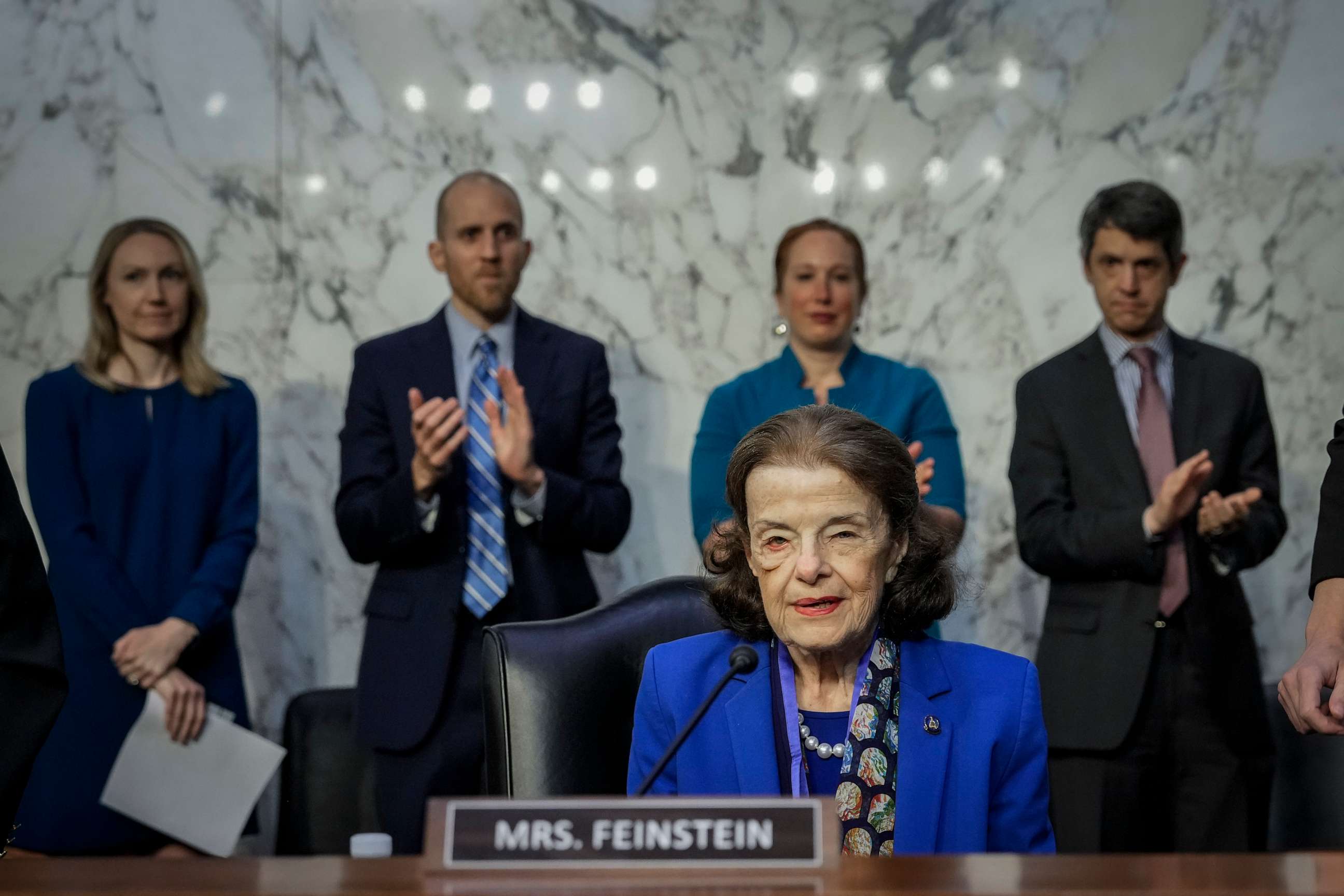

Dianne Feinstein, who became California's first female senator and went on to serve six terms, the longest of any woman in Senate history -- and whose political career was forever changed by the assassination of two colleagues -- has died, multiple sources confirm to ABC News. She was 90.
Over her three decades in the Senate, Feinstein transformed from a barrier-breaking member of the Democratic Party's liberal vanguard, championing the legalization of same-sex marriage and a ban on assault-style weapons, to one of the Washington's establishment members, esteemed by lawmakers on both sides of the aisle but increasingly criticized by outside progressives who argued that she refused to step aside for the next generation.
In her final years, her work on Capitol Hill had also begun to be overshadowed by concern about her mental and physical health even as she insisted she remained a robust public servant, despite her hospitalizations, reports of episodes of confusion and other issues.
In announcing that she planned to retire at the end of her latest term, in 2025, Feinstein said: "Each of us was sent here to solve problems. That's what I've done for the last 30 years, and that's what I plan to do for the next two years. My thanks to the people of California for allowing me to serve them."

Journalist Rebecca Traister, who profiled Feinstein at length for New York magazine, told ABC News for this obituary that she believes Feinstein's approach to politics was less tethered to an absolutist ideology than to defending and supporting the importance of rules and order.
Feinstein's political positions changed over time, but what didn't was how she saw her job: "as somebody who was within these institutions to uphold the rules," Traister said.
She said what she found most surprising about Feinstein was that devotion to the institution -- outside of politics.
She cited how, in the early 1960s, before Roe v. Wade, Feinstein determined punishments for abortion providers during her time on a women's sentencing board, where Feinstein later said she saw "not medical people -- these were truly the coat-hanger type of abortions." As a pro-abortion access supporter in college, Feinstein reportedly helped a woman get to Mexico where abortion was legal, Traister said.
"She believed in civic and political control and order, and I would say that is the defining feature of her life in politics," Traister said, adding, "Sometimes that led her to positions that were on the left and sometimes it led her to positions that were on the right."
Born Dianne Emiel Goldman in 1933 in San Francisco, the first years of Feinstein's life were filled with hardship. Jerry Roberts, author of the Feinstein biography "Never Let Them See You Cry," described Feinstein's mother, Betty, as an alcoholic who frequently beat her and her two sisters, citing in his book moments where she chased Feinstein with a knife and once nearly drowned one of Feinstein's sisters in a bathtub.
"Their mother was both emotionally and physically abusive. She [Feinstein] was very much the matriarchal figure in terms of protecting her younger sisters and taking the brunt of things," Roberts said.
Feinstein's surgeon father, Leon, was just as instrumental in shaping her. A barrier-breaker himself, he was the first Jewish chair of surgery at the University of California at San Francisco's medical school.
"She really identified with her father and his kind of propriety and status," said Traister. "But it's certainly true that as the oldest sibling in that household, she really developed a passion for how to keep things in line and under control that I think you can see working its way through her political life."
After serving six years on California women's sentencing board, Feinstein ran for -- and won -- a race to be on the San Francisco Board of Supervisors, beginning the first of three terms in 1970.
Her third term as a supervisor was her last and, as she suggested to reporters on the morning of Nov. 27, 1978, it was intended to be her final chapter in politics. She had lost two mayoral bids, was facing health problems and recently lost her second husband to cancer.
Then tragedy struck.
Later that November day, a colleague on the board, Supervisor Dan White, assassinated Mayor George Moscone and Supervisor Harvey Milk, California's first openly gay elected official.
It was Feinstein who found Milk's body, subsequently recalling how her fingers slipped through a bullet hole in his body as she went to take his pulse. With TV cameras rolling, she was the one to tell a shocked city about the slayings. As the president of the Board of Supervisors, she became the city's first female mayor.

"It sounds like it was scripted in a movie. She leans in, tells reporters she's leaving politics -- you can't make up something like that," said Los Angeles Times columnist Mark Barabak, who covered Feinstein going back to her San Francisco days.
She went on to win two terms as mayor.
Barabak said Feinstein "held up the city on her shoulders ... the city was really on edge." She was "thrust in the middle of it" and "really rallied and really helped keep the city together," he said.
As mayor, she enacted a handgun ban and survived a recall attempt over it, foreshadowing a decadeslong fight over the same issue when she served in the Senate.
Her profile grew quickly. She was on Democratic presidential nominee Walter Mondale's vice presidential short list in 1984. After losing her own race for governor of California in 1990, she successfully ran in a 1992 special election to serve out the remainder of Republican Pete Wilson's term -- becoming the first women elected from the state to serve as a senator.
This is a developing story. Please check back for updates.
